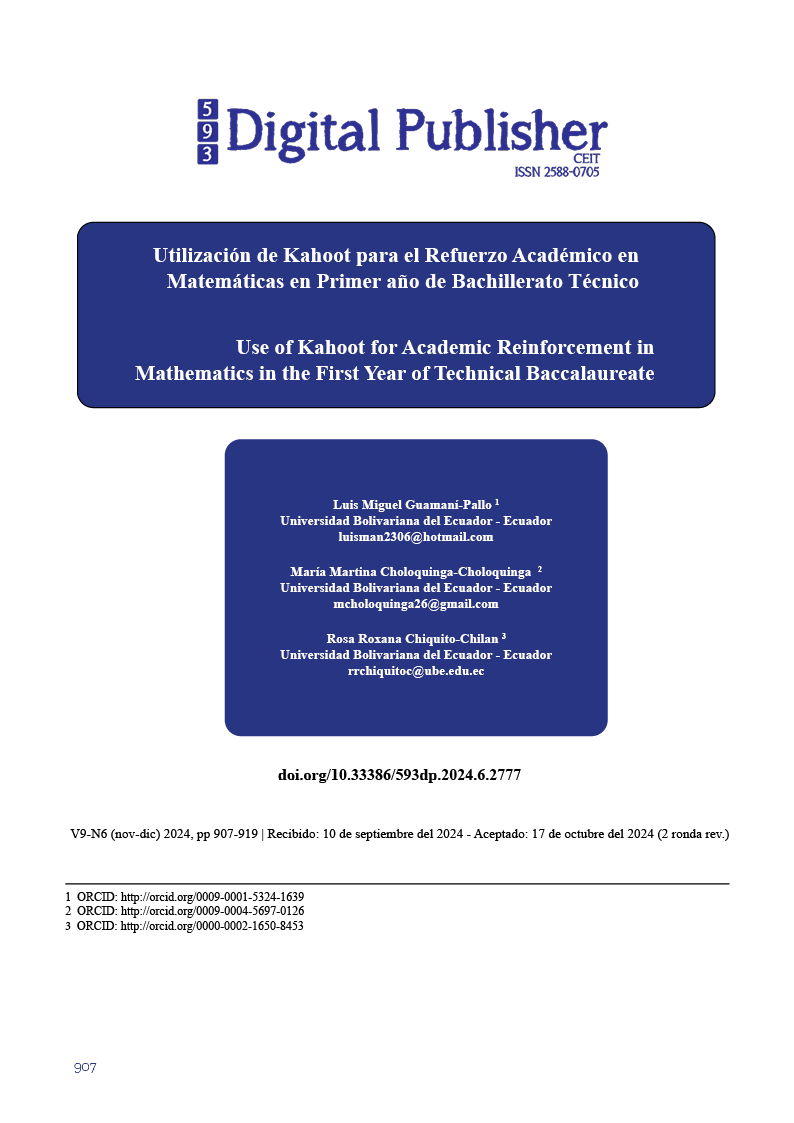Use of Kahoot for Academic Reinforcement in Mathematics in the First Year of Technical Baccalaureate
Main Article Content
Abstract
Academic reinforcements have become important tools within the teaching-learning processes in schools and colleges in Ecuador since the pandemic. The objective is to implement the use of the kahoot platform in the development of academic reinforcement in the mathematics subject of the first year of Technical Baccalaureate in the Jatari Unancha Educational Unit of the Pujilí Canton, Province of Cotopaxi. Theoretical research methods associated with the Kahoot tool, the constructivist approach and particularly for the mathematical subject are applied. A diagnosis is applied using empirical methods: observation, documentary review, interview with selected teachers and survey of 50 students involved (verified its validity and reliability with the application of Cronbach's Alpha and R-squared tests with the SPSS software version 25). The reinforcement activity is designed and applied and progress is demonstrated in terms of academic results and further development of basic competencies; as well as through the application of the Net Promoter Index, the perception of teachers regarding the ability to be recommended, the experience carried out was excellent (90 percentage units).
Downloads
Article Details

This work is licensed under a Creative Commons Attribution-NonCommercial-ShareAlike 4.0 International License.
1. Derechos de autor
Las obras que se publican en 593 Digital Publisher CEIT están sujetas a los siguientes términos:
1.1. 593 Digital Publisher CEIT, conserva los derechos patrimoniales (copyright) de las obras publicadas, favorece y permite la reutilización de las mismas bajo la licencia Licencia Creative Commons 4.0 de Reconocimiento-NoComercial-CompartirIgual 4.0, por lo cual se pueden copiar, usar, difundir, transmitir y exponer públicamente, siempre que:
1.1.a. Se cite la autoría y fuente original de su publicación (revista, editorial, URL).
1.1.b. No se usen para fines comerciales u onerosos.
1.1.c. Se mencione la existencia y especificaciones de esta licencia de uso.
References
Arnaz, J. A. (2011). La planeación curricular (Vol. 8). Bogotá: Trillas.
Beltran, J. (2010). Procesos, estrategias y técnicas de aprendizaje. Rancagua: Síntesis.
Burgelman, F. (2002). Estrategias Metodológicas.
Campanario, J., & Moya, A. (2010). ¿Cómo enseñar ciencia?. Enseñanaza de la ciencia (vol17). Asunción : TREMUS.
Canabal, C., & Margalef, L. (2017). La retroalimentación: La clave para una evaluación orientada al aprendizaje. Revista de Currículum y Formación del Profesorado, 21(2). doi:https://doi.org/10.30827/profesorado.v21i2.10329
Deleuze, G. (1987). Aplicación docente de las estrategias metodológicas. Barcelona España: Ediciones Paidos.
Díaz Gonzales, A. (2009). Estrategias Metodológicas. Obtenido de Estrategias Metodológicas: http://aureadiazgonzales.galeon.com/
Ecuador, M. d. (15 de junio de 2023). Página del Ministerio de Educación del Ecuador. Obtenido de Página del Ministerio de Educación del Ecuador: https://educacion.gob.ec/tips-de-uso/
Español, e. P. (28 de 03 de 2024). e_ducagob Portal del Sistema Educativo Español. Obtenido de e_ducagob Portal del Sistema Educativo Español: https://educagob.educacionfpydeportes.gob.es/curriculo/curriculo-lomloe/menu-curriculos-basicos/ed-secundaria-obligatoria/competencias-clave/mat-ciencia-tec.html
Fies, C., & Marshall, J. (2006) Classroom response systems: A review of the literature. Journal of Science
Education and Technology, 15 (1), pp. 101-109. doi:10.1007/s10956-006-0360-1
Fuenmayor, J. (24 de Septiembre de 2020). jesusfuenmayor.com. Obtenido de jesusfuenmayor.com: https://jesusfuenmayor.com/2020/09/24/caracteristicas-de-la-educacion-en-el-siglo-xxi/
García, L. (2009). Estrategias de transformación de la institución docente como institución socializadora. La Habana (informe de investigación): ICCP.
Giménez, G., & de Castro, R. (2020). Dispositivos Móviles en Educación Superior: la experiencia con Kahoot! revistadyo, 3. Obtenido de file:///C:/Users/usuario/Downloads/admin,+DyO70-1-5-18%20(1).pdf
Guevara , G., Verdesoto, A., & Castro, N. (2020). Recimundo. 4(3), 2. doi:https://doi.org/10.26820/recimundo/4.(3).julio.2020.163-173
Hernández, R. (1987). Guia didáctica de las estrategias metodológicas.
Instituno Nacional de Evaluación Educativa. (1,4 de Julio de 2014). Informe Nacional Ser Bachiller. Obtenido de INEV en Matemática: http://www.ineval.gob.ec/_in2_bin/IN_SB2014_SIERRA_03092014.pdf
Instituto Miguel de Cervates. (12 de 2023). ¿QUÉ OPINA LA PEDAGOGÍA MODERNA SOBRE LA EDUCACIÓN PERSONALIZADA? Obtenido de https://institutomigueldecervantes.com.mx/que-opina-la-pedagogia-moderna-sobre-la-educacion-personalizada/#:~:text=Enfoque%20centrado%20en%20el%20estudiante,intereses%20y%20formas%20de%20aprendizaje.
Juliano, D. (2012). Estrategias de elaboración e identidad.Etnicidad e identidad. Antofagasta: Patros.
Lic. German Jazmany Zambrano Verdesoto, M. (28 de 09 de 2013). pedagogia.edu.ec. Obtenido de pedagogia.edu.ec: https://www.pedagogia.edu.ec/public/docs/Comision_9/influencia_de_las_estrategias_metodologicas_activas.pdf
Loor, K., & Alarcón , L. (2021). Estrategias metodológicas creativas para potenciar los Estilos de Aprendizaje. Scielo, 3.
Lopez, O., Gloria, Ñ., Faiver, S., & Leonardo Ruiz. (2012). Estrategia Socializadoras. Obtenido de Estrategia Socializadoras: http://olgasofialopez.blogspot.com/
López, S. C. (1988). El Refuerzo Pedagógico. Madrid: Escuela Española.
Magadan-Diaz, M. &.-G. (2022). Classroom gamification in online higher. Campos Virtuales, 137-152. Obtenido de https://doi.org/10.54988/cv.2022.1.978
Martínez, C. (01 de 2018). Investigación descriptiva: definición, tipos y características. Obtenido de https://www.lifeder.com/investigacion-descriptiva
Mendoza, C. (2001). Aplicación de estrategias metodológicas en el aula de clase.
Mineduc. (2016). Instructivo para planificaciones curriculares para el Sistema Nacional de Educación. Minesterio de educacion.
MINEDUC. (2019). INSTRUCTIVO PARA ELABORAR LAS PLANIFICACIONES.
Monereo, C. c. (01 de 2008). Estrategias docentes en el proceso enseñanza aprendizaje. Obtenido de Estrategias docentes en el proceso enseñanza aprendizaje: http://www.monografias.com/trabajos61/propuesta-estrategias-docentes/propuesta-estrategias-docentes2.shtml
Mundo Primaria. (02 de 12 de 2014). El refuerzo Pedagógico. Obtenido de El refuerzo Pedagógico: http://www.mundoprimaria.com/pedagogia-primaria/refuerzo-educativo-y-apoyo-especializado.html
Pitas, S., & Pèrtegas, S. (s.f.).
Ramirez, M. (. (2004). Sobre el Proceso de Enseñanza Aprendizaje. Instituto de Educación y Pedagogía IEP, Universidad del Valle, Cali, Colombia. Cali: Instituto de Pedagogía.
Reyes-Pacheco, E., Becerra-Garcí, E., & & Quintana-Pacheco, k. (2022). B-learning como estrategia pedagógica extracurricular de refuerzo. . 593 Digital Publisher CEIT, 7(4), 17-35, 19. Obtenido de https://doi.org/10.33386/593dp.2022.4.1077
Rodas Lozano, J. P. (28 de 02 de 2020). ESTRATEGIAS METODOLÓGICAS DE ENSEÑANZA APRENDIZAJE PARA. Obtenido de Universidad Nacional de Loja : https://dspace.unl.edu.ec/jspui/bitstream/123456789/23201/1/JORGE%20PATRICIO%20RODAS%20LOZANO.pdf
Rossi Quiroz, E. J. (02 de 08 de 2011). Propuestas Educativas. Obtenido de Propuestas Educativas: http://peducativas.blogspot.com/2011/08/pensamiento-educativo-de-walter.html
SALESIANA, C. D. (23 de 05 de 2024). CES Don BOSCO UNIVERSIDAD SALESIANA. Obtenido de CES Don BOSCO UNIVERSIDAD SALESIANA: https://cesdonbosco.com/la-importancia-de-la-educacion-en-el-siglo-xxi/#:~:text=En%20el%20siglo%20XXI%2C%20la%20educaci%C3%B3n%20debe%20adaptarse%20a%20los,la%20colaboraci%C3%B3n%20y%20la%20adaptabilidad.
Scrib.com. (08 de 11 de 2008). Definición de método. Obtenido de Definición de método: http://webcache.googleusercontent.com/search?q=cache:pUgAIa8ZxlAJ:https://es.scribd.com/doc/7817523/DEFINICION-DE-METODO+&cd=5&hl=es&ct=clnk&gl=ec
Ulaonline. (2017). INVESTIGACIÓN EXPLORATORIA: Fundamentos básicos. 1. Obtenido de https://practicasprofesionales.ula.edu.mx/documentos/ULAONLINE/Maestria/MAN/HRM558/Publicaci%C3%B3n/Semana_3/Estudiante/HRM558_S3_E_Inv_explo.pdf
UNIVERSIDAD NACIONAL DE EDUCACIÓN. (15 de 12 de 2021). Estrategias didácticas para el refuerzo académico en matemática. Obtenido de https://recursos.educacion.gob.ec/wp-content/uploads/2021/Aprender_a_tiempo/Recuperando_Aprendizajes/Estrategias%20did%C3%A1cticas%20para%20el%20refuerzo/Estrategias-did%C3%A1cticas-para-el-refuerzo-acad%C3%A9mico-en-matem%C3%A1tica.pdf




